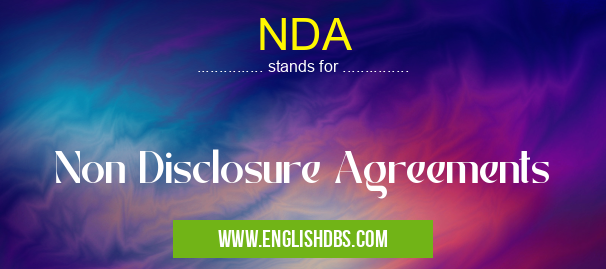What does NDA mean in UNCLASSIFIED
NDA stands for Non-Disclosure Agreement. It is a legal contract between two parties, which sets out the confidential information that will be shared between the parties and sets out how this information should be used. NDAs are often used when companies need to share confidential business information with outside suppliers, consultants or customers. The agreement also provides protection for both parties and establishes a clear understanding of what is expected from each party in terms of confidentiality.

NDA meaning in Unclassified in Miscellaneous
NDA mostly used in an acronym Unclassified in Category Miscellaneous that means Non Disclosure Agreements
Shorthand: NDA,
Full Form: Non Disclosure Agreements
For more information of "Non Disclosure Agreements", see the section below.
Definition
In general, an NDA (Non-Disclosure Agreement) is a legally binding contract between two parties, wherein one party agrees not to share or disclose certain confidential information belonging to the other. The confidential information covered under the NDA may include trade secrets, intellectual property (IP), proprietary business knowledge or any other confidential material owned by one of the parties. NDAs can also be called Confidentiality Agreements or Secrecy Agreements and they protect both parties from any liability arising from general contractual obligations such as negligence or breach of confidence.
Benefits of Using NDA
Using an NDA can provide several advantages to both disclosing and receiving party involved in a project or business deal. For example, an NDA allows companies to disclose sensitive data without worrying about it being disclosed publicly or even used as leverage against them in negotiations down the road. It also facilitates collaboration between company and third-party supplier without fear that outside ideas will be stolen or somehow misused. Furthermore, having an NDA in place may help strengthen customer relationships as customers feel more secure that their data won't end up in the wrong hands. Additionally, using an NDA can provide support if either side needs legal recourse down the line due to breach of contract situation.
Essential Questions and Answers on Non Disclosure Agreements in "MISCELLANEOUS»UNFILED"
What is an NDA?
A Non Disclosure Agreement (NDA) is a legally binding document that requires parties to maintain the confidential information shared during a business transaction. It prevents businesses from sharing sensitive information with third parties without permission.
How do NDAs protect confidential information?
An NDA outlines the terms and conditions for how confidential information is handled and disposed off, which ensures that the recipient can not exploit it or make use of it for any purpose other than what was initially agreed upon.
Are all NDAs enforceable in court?
Yes, NDAs are typically enforceable in court as long as they meet applicable legal requirements such as clarity, completeness, and consideration (both sides getting something of equal value).
Is an NDA transferable?
Generally no, an NDA is only binding on the parties signatory to the agreement. However, if both parties agree to transfer their rights and responsibilities under the agreement to a third party then this would be allowed.
Are there different types of NDAs?
Yes, there are two main types of NDAs - unilateral and bilateral. Unilateral NDAs protect confidential information disclosed by one party while bilateral agreements protect information exchanged between two or more parties.
Who should be listed as signatories on an NDA?
The signatories must include individuals who have access to confidential information that needs protecting such as employees of companies involved in the transaction. Any person who has knowledge of or could gain knowledge of protected knowledge must also be added as necessary.
What obligation does each party have under an NDA?
Each party has a duty to uphold their obligations under the agreement which includes keeping all confidential information secure and not disclosing it or using it for any purpose other than what was intended when entering into the agreement.
What happens if one party breaches the NDA?
If a party breaches an NDA, then they may face civil remedies such as lawsuits or financial penalties for violating its terms. In some cases criminal charges may even apply depending on what type of breach occurred and how much financial loss was suffered by another party due to this breach activities.
Final Words:
NDAs are extremely important documents for businesses of all sizes and across industries in order to protect their confidential information from mismanagement by outsiders. They are simple contracts that outline exactly what each party must do in regards to confidentiality of company data and intellectual property so there’s no confusion over who owns what rights going forward down the road. When done properly, NDAs provide legal security for both sides so everyone involved can go about their business with confidence knowing their IP is safe from prying eyes or inappropriate use.
NDA also stands for: |
|
| All stands for NDA |
